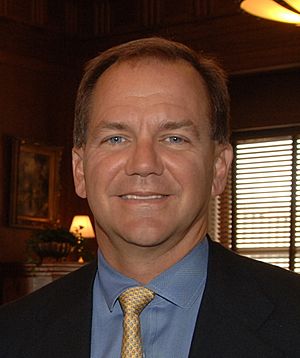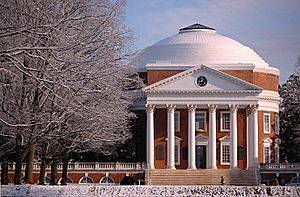Paul Tudor Jones facts for kids
Quick facts for kids
Paul Tudor Jones
|
|
|---|---|
 |
|
| Born |
Paul Tudor Jones II
September 28, 1954 Memphis, Tennessee, U.S.
|
| Education | University of Virginia (BA) |
| Occupation | Hedge fund manager |
| Years active | 1980–present |
| Known for | Predicting Black Monday Founder of the Robin Hood Foundation |
| Title | CEO, Tudor Investment Corporation |
| Spouse(s) |
Sonia Klein
(m. 1988) |
| Children | 4 |
Paul Tudor Jones II (born September 28, 1954) is an American billionaire who manages investments, protects nature, and gives to charity. In 1980, he started his own company, Tudor Investment Corporation, which helps manage money for others. Eight years later, he created the Robin Hood Foundation. This organization works to help people escape poverty. In July 2024, his wealth was estimated to be around US$8.1 billion.
Contents
Early Life and Education
Jones was born in Memphis, Tennessee. His father, John Paul "Jack" Jones, was a lawyer who also ran The Daily News, a newspaper his family had owned since 1886.
Paul Tudor Jones went to Presbyterian Day School, an elementary school for boys. He then attended Memphis University School for high school. Later, he went to the University of Virginia. While there, he was a champion boxer in the welterweight division. To help pay for his college tuition, Jones wrote for his family's newspaper using the pen name Paul Eagle.
In 1976, he earned a bachelor's degree in economics from the University of Virginia. He was accepted into Harvard Business School in the 1980s but decided not to go.
Career Highlights
Starting in Trading
After graduating from college in 1976, Jones wanted to learn about trading. His cousin, William Dunavant Jr., who ran a large cotton trading company, introduced him to Eli Tullis. Tullis was a commodity broker in New Orleans. Tullis hired Jones and taught him how to trade cotton futures at the New York Cotton Exchange.
One time, Tullis even fired Jones because he fell asleep at his desk after a night out! Many years later, Jones became an important leader at the New York Cotton Exchange. He served as treasurer in 1986 and then as chairman from 1992 to 1995.
At 24 years old, Jones became a commodities broker for E. F. Hutton & Co. There, he met and became friends with Glenn Dubin.
Tudor Investment Corporation
In 1980, Jones started his own company, Tudor Investment Corporation. It is an asset management firm located in Stamford, Connecticut. When he started, Jones was not very well known. His cousin Dunavant and his mentor Tullis were some of his first clients. Tudor Investment Corporation now manages about $12 billion.
The company invests in many different areas around the world. This includes things like global macro trading, which looks at big economic trends. They also invest in stocks, emerging markets, and commodities like cotton.
Predicting Black Monday One of Jones's biggest successes was predicting Black Monday in 1987. This was a huge stock market crash. Because he had bet that the market would go down, he tripled his money during the crash. His company earned an estimated $100 million that year.
His second-in-command, Peter Borish, helped predict the crash. Borish compared the market trends of 1987 to those before the 1929 stock market crash.
Later Years In the 1990s, Jones helped create FINEX, a part of the New York Board of Trade. This division deals with financial futures, like the U.S. dollar index futures contract. In 1990, he earned a lot of money by betting against the Japanese stock market as its bubble burst.
In 1994, Tudor Investment Corporation paid a fine to the SEC. This was to settle claims that they had broken a rule about selling borrowed stocks.
In the 2000s, the New York Times noted that Tudor's returns for clients had become less dramatic. This was partly because Jones chose to trade more carefully. Also, there were fewer big changes in interest rates and currencies, and more competition from other investment firms.
Investments
Castleton Commodities International
In 2012, Paul Tudor Jones, along with Glenn Dubin and Timothy Barakett, joined a group of investors. They bought a large energy trading business called Louis Dreyfus Highbridge Energy. The new company was named Castleton Commodities International, LLC.
Investment Style
Jones's trading style is called "global macro." This means he looks at big economic and political events around the world to make investment decisions. He often uses technical analysis, which involves studying charts and past market data. He also focuses on "momentum," which means investing in things that are already moving strongly in one direction.
In 2020, Jones also shared that he owns bitcoin. He sees it as a way to protect his wealth if inflation, which is when prices go up, becomes a problem.
Wealth and Giving
In November 2019, Forbes Magazine estimated his net worth to be US$5.3 billion. This made him one of the richest people in the world and one of the highest-earning hedge fund managers.
In 2019, Jones and his wife, Sonia, joined the Giving Pledge. This is a promise by wealthy individuals to give away most of their money to charity. They mentioned their religious beliefs as a reason for this decision.
Conservation Efforts
Paul Tudor Jones is also known for his work in conservation. In 1990, he faced a legal issue for damaging protected wetlands on his property. He paid a large fine and restitution to the National Fish and Wildlife Foundation.
In 1993, Jones helped start the Everglades Foundation. This organization works to protect the Everglades, which are important wetlands in Florida. He leads the board of this organization.
In 2006, the New York Times called Jones an "American conservationist." They reported that in 2002, the Tanzanian government leased him the Grumeti reserve in Tanzania. Jones pays the hunting fees for this area and has almost stopped hunting there. This helps protect the wildlife.
In 2016, the National Audubon Society gave Jones the Audubon Medal. This award recognized his efforts to combine conservation with economic success and protect animal habitats.
Philanthropy
In 1986, Jones was inspired by a TV show about a businessman who helped students. Jones decided to "adopt" a sixth-grade class in Bedford–Stuyvesant, Brooklyn. He promised college scholarships to the students who graduated from high school. His goal was for 90% of them to finish high school. However, only 33% of the students graduated.
Jones realized he had "vastly underestimated" the challenges these students faced. He learned important lessons from this experience. He later applied these lessons to other education projects.
In 2004, Jones founded the Excellence Charter School. This was the first all-boys charter school in the country, located in Brooklyn, New York. He also founded and chaired the Bedford Stuyvesant I Have A Dream Foundation, which helps local students go to college.
University of Virginia Giving

Jones has given large donations to his old university, the University of Virginia. One donation of $44 million helped build a new basketball arena. This arena was named the John Paul Jones Arena in honor of his father. In 2012, Jones and his wife, Sonia, gave $12 million to create a new Contemplative Sciences Center at the university.
Robin Hood Foundation
Jones is the founder of the Robin Hood Foundation. This charity is supported by many people in the investment world. It works to reduce poverty in New York City. Other founding members include Peter Borish and Glenn Dubin.
Just Capital
He also started a nonprofit organization called Just Capital. This group helps Americans learn about companies that are considered "just" or fair. They use surveys to find out what priorities Americans care about most, like how companies treat their workers or the environment. Just Capital also has an investment fund that includes only companies believed to be "just."
Politics and Associations
Paul Tudor Jones is politically independent. He has given money to both Democratic and Republican political candidates. For example, he donated to Mitt Romney in 2012. He also hosted a fundraiser for Barack Obama during the 2008 presidential election. Jones also supported the presidential campaigns of John McCain and Rudy Giuliani.
Jones has also served as a director for the Futures Industry Association. He helped create an educational part of this association, which is now called the Institute for Financial Markets. He also supported the creation of the first ethics training course for futures exchanges in the United States.
Reputation
In 1987, a documentary called Trader was made about Jones. It showed him as a young man predicting the 1987 stock market crash. Jones later asked for the documentary to be removed from circulation. Some people think he did this because it might have revealed his trading secrets.
In 1988, The Wall Street Journal wrote a front-page story about Jones. They called him "the most-watched, most-talked-about man on Wall Street."
Jones generally kept a low profile in the financial media. However, he did appear on shows like Larry King Live to promote his conservation work and the Robin Hood Foundation.
Reuters described Jones in 2019 as "one of the giants" and a "legend" among macro traders.
In 2008, he was added to Institutional Investors Alpha's Hedge Fund Manager Hall of Fame. In 2019, he received the Golden Plate Award from the American Academy of Achievement.
Personal Life
In 1988, Jones married Sonia Klein, who is from Australia and is a yoga entrepreneur. They have four children: three daughters and one son. His oldest daughter, Caroline, is a country-pop singer and is part of the Zac Brown Band. Jones has encouraged his daughters to learn about macro trading. He lives in Palm Beach, Florida.
See also
 In Spanish: Paul Tudor Jones para niños
In Spanish: Paul Tudor Jones para niños
- List of University of Virginia people

